Related Research Articles

Chinua Achebe was a Nigerian novelist, poet, and critic who is regarded as a central figure of modern African literature. His first novel and magnum opus, Things Fall Apart (1958), occupies a pivotal place in African literature and remains the most widely studied, translated, and read African novel. Along with Things Fall Apart, his No Longer at Ease (1960) and Arrow of God (1964) complete the "African Trilogy". Later novels include A Man of the People (1966) and Anthills of the Savannah (1987). In the West, Achebe is often referred to as the "father of African literature", although he vigorously rejected the characterization.

Enugu is the capital city of Enugu State in Nigeria. It is located in southeastern part of Nigeria. The city had a population of 820,000 according to the last Nigerian census. The name Enugu is derived from the two Igbo words Énú Ụ́gwụ́, meaning "hill top", denoting the city's hilly geography. Enugu acquired township status in 1917 and was called Enugwu-Ngwo, but because of the rapid expansion towards areas owned by other indigenous communities, the city was renamed Enugu in 1928.
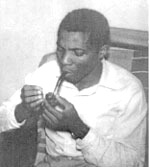
Christopher Ifekandu Okigbo was a Nigerian poet, teacher, and librarian, who died fighting for the independence of Biafra. He is today widely acknowledged as an outstanding postcolonial English-language African poet and one of the major modernist writers of the 20th century.

The Nigerian Civil War, also known as the Nigerian–Biafran War or the Biafran War, was a civil war fought between Nigeria and the Republic of Biafra, a secessionist state which had declared its independence from Nigeria in 1967. Nigeria was led by General Yakubu Gowon, while Biafra was led by Lieutenant Colonel Chukwuemeka "Emeka" Odumegwu Ojukwu. Biafra represented the nationalist aspirations of the Igbo ethnic group, whose leadership felt they could no longer coexist with the federal government dominated by the interests of the Muslim Hausa-Fulanis of Northern Nigeria. The conflict resulted from political, economic, ethnic, cultural and religious tensions which preceded the United Kingdom's formal decolonisation of Nigeria from 1960 to 1963. Immediate causes of the war in 1966 included a military coup, a counter-coup, and anti-Igbo pogroms in Northern Nigeria.

Chief Cyprian Odiatu Duaka Ekwensi was a Nigerian author of novels, short stories, and children's books.
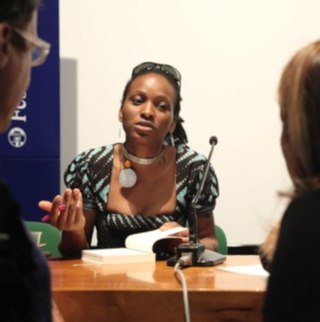
Chika Nina Unigwe is a Nigerian-born Igbo author who writes in English and Dutch. In April 2014 she was selected for the Hay Festival's Africa39 list of 39 Sub-Saharan African writers aged under 40 with potential and talent to define future trends in African literature. Previously based in Belgium, she now lives in the United States.

Florence Nwanzuruahu Nkiru Nwapa, was a Nigerian author who has been called the mother of modern African Literature. She was the forerunner to a generation of African women writers, and the first African woman novelist to be published in the English language in Britain. She achieved international recognition with her first novel Efuru, published in 1966 by Heinemann Educational Books. While never considering herself a feminist, she was best known for recreating life and traditions from an Igbo woman's viewpoint.
Nkem Nwankwo was a Nigerian novelist and poet.
Ada Udechukwu is a Nigerian artist and poet associated with the Nsukka group.
Half of a Yellow Sun is a novel by Nigerian author Chimamanda Ngozi Adichie. Published in 2006 by 4th Estate in London, the novel tells the story of the Biafran War through the perspective of the characters Olanna, Ugwu, and Richard.
Pacesetter Novels are a collection of 130 works of popular fiction written by notable African authors, published by Macmillan. The series was started in 1977, with the first book being Director! by Agbo Areo.

The fall of Enugu was a military conflict between Nigerian and Biafran forces in September and October 1967 during the Nigerian Civil War which centered around Enugu, the capital of the secessionist Republic of Biafra. Nigerian federal forces had made Enugu's capture a priority shortly after war broke out, but their advance stalled at Nsukka. Biafran president and leader Odumegwu Ojukwu, attempted to distract the Nigerian Army by initiating an invasion of Nigeria's Mid-Western Region in August, but the offensive was brought to a halt. Lieutenant Colonel Theophilus Danjuma took charge of the Nigerian forces at the Nsukka front and prepared to advance on Enugu with seven battalions of the 1st Division. Enugu was garrisoned by one brigade led by Colonel Alexander Madiebo and poorly armed civilians called into service. Danjuma decided to launch an offensive with his forces spread over a broad front to make it more difficult for the Biafrans to block them along major roads as had happened up to that point.
The Abagana Ambush was an ambush by Biafran guerrilla troops led by Major Jonathan Uchendu that wiped out the Nigerian 2 Division. Of the 6,000 Nigerian troops ambushed, only a very small number survived, including the 2nd Division's commander, General Murtala Muhammed.
Ifeoma Okoye is a Nigerian novelist. She has been referred to by fans as "the most important female novelist from Nigeria after Flora Nwapa and Buchi Emecheta," according to Oyekan Owomoyela. She was born in Anambra State in Eastern Region, Nigeria. She went to school at St. Monica's College in Ogbunike to receive a teaching certificate in 1959. She then graduated from the University of Nigeria in Nsukka to earn a Bachelor of Arts honours degree in English in 1977. She wrote novels including Behind the Clouds, children's novels and short stories, such as The Village Boy and Eme Goes to School.
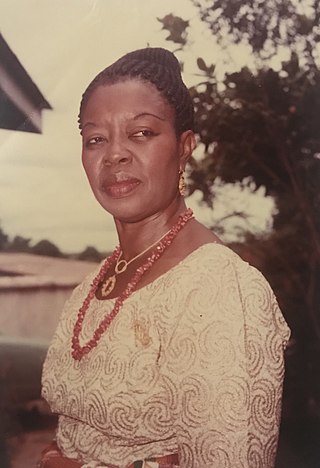
Teresa Ekwutosi Agbomma Meniru was a Nigerian writer of young adult literature and children's stories.
Celestine Ukwu was a Nigerian Igbo highlife musician during the 1960s and 1970s, best known for his hit songs "Ije Enu", "Igede" and "Money Palava". Described as a "prolific and outstanding composer" by music critic Benson Idonije of Radio Nigeria Two, Ukwu's works have been featured on various world music compilations including The Rough Guide to Highlife and The Rough Guide to Psychedelic Africa.
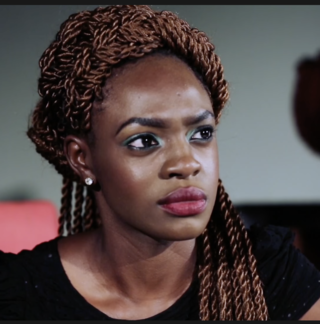
Beverly Ada Mary Osu is a Nigerian video vixen, model and actress. She is predominantly known for her roles in several films and for her participation in the 8th season of Big Brother Africa. Osu won Model of the Year at the 2011 Dynamix All Youth Awards.
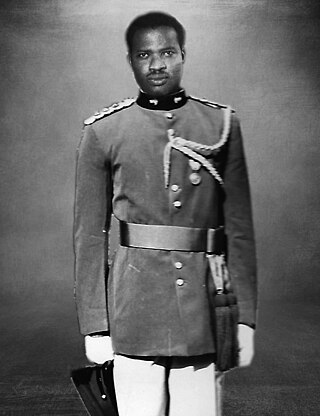
Ejike Ebenezer Obumneme Aghanya was a military officer and electrical engineer who served in the Nigerian Army and the Biafran Armed Forces, retiring as a colonel. Accused of involvement in the 1966 Nigerian coup d'état he was arrested and imprisoned without trial until the outbreak of the Nigerian Civil War where he served on the side of Biafra, holding key positions in the Biafran Armed Forces. He was the head of the Biafran Agency for Research and Production (RAP) which produced bombs, rockets, missiles, as well as ammunition, armored vehicles, telecommunication gadgets and petroleum refineries among others for the Biafran Armed Forces. Later he was the Chief of Staff of the Biafran Organisation of Freedom Fighters (BOFF) which was the guerrilla warfare and special operations arm of the Biafran Armed Forces. He also served as Battalion Commander, 44th Electrical and Mechanical Engineer Battalion Biafran Army and later Brigade Commander of the 58th Brigade of 12th Infantry Division Biafran Army during the war.

War Girls is a 2019 science fiction novel by Nigerian-American author Tochi Onyebuchi. The novel depicts a post-apocalyptic future world that has been environmentally devastated by nuclear conflict and global warming. The North American and European powers responsible for the devastation have escaped to colonies in space and exploited the nations left on Earth for their scarce remaining resources. In the novel, characters Ify and Onyii navigate a Nigeria torn apart by a resurgent Nigerian Civil War. The novel explores themes of colonialism, climate change, war, and posthumanism. It is an Africanfuturist work of climate fiction.
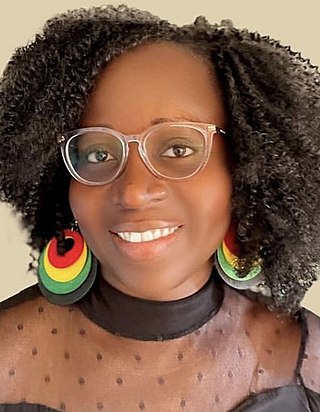
Adaeze Ifeoma Atuegwu is a Nigerian-American novelist and writer whose works include novels, children's stories, medical non-fiction, and drama. She is considered one of Nigeria's youngest most prolific authors with 17 books published by the age of seventeen.
References
- 1 2 3 "Surviving Biafra | Hurst Publishers".
- ↑ Griswold, Wendy (2000). Bearing Witness: Readers, Writers, and the Novel in Nigeria. Princeton, New Jersey: Princeton University Press. p. 280. ISBN 978-0691058290.
- 1 2 3 4 5 6 Umelo Rosina . The Oxford Encyclopedia of Children's Literature. Oxford University Press. 1 January 2006. ISBN 978-0-19-514656-1 . Retrieved 3 February 2016.
- 1 2 Schmidt, Nancy (1984). "Stories About West Africans". Africa Today. 31 (1): 69–70. JSTOR 4186214.
- ↑ "Surviving Biafra: A Nigerwife's Story".
- ↑ Erwin, Lee (2002). "Genre and Authority in Some Popular Nigerian Women's Novels". Research in African Literatures. 33 (2): 81–99. doi:10.2979/RAL.2002.33.2.81. S2CID 162320386.
- ↑ Wells, Earl; Wells, Eursla (7 April 1994). "Books & Things: Nurturing the Image of the Black Child". Miami Times. Archived from the original on 20 February 2016. Retrieved 3 February 2016– via HighBeam Research.
- ↑ "Surviving Biafra: A Nigerwife's Story". 11 September 2019.